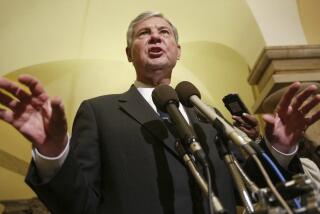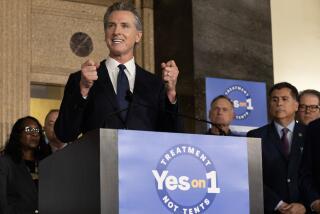For Showdown With Front-Runner, Gramm Must Break Free From Pack
- Share via
ORLANDO, Fla. — Bob Dole’s narrow victory over Phil Gramm and Lamar Alexander in Saturday’s Florida Republican straw poll here kept the GOP presidential race locked in its peculiar state of suspended animation. Dole can’t break free from the other contenders. But neither can they dislodge him from his lead.
As he demonstrated with his siege-like courting of the delegates here, Dole has protected his advantage with a tenacious and well-managed campaign. But as important as anything Dole has done have been two things that didn’t happen. Former Joint Chiefs of Staff Chairman Colin L. Powell didn’t run for the nomination. And Gramm failed to establish himself as the clear conservative alternative to the front-runner.
Powell’s decision spared Dole a competitor of comparable national stature. Gramm’s troubles have been key because most Republicans earlier this year believed the acerbic and relentless senator from Texas had the best chance of unifying Republicans dissatisfied with Dole.
Gramm didn’t waste 1995. He’s raised more money and built a stronger national organization than anyone except Dole. But Gramm’s inability to generate more public enthusiasm for his candidacy has allowed the anti-Dole sentiment in the party to diffuse.
Now, instead of facing one strong rival, Dole is in an enviable situation of divide and rule: Most recent polls in Iowa and New Hampshire, as well as national surveys, show Gramm, Alexander, Patrick J. Buchanan and Malcolm S. (Steve) Forbes Jr. all bunched closely together--and far behind the front-runner.
What went wrong this year for Gramm? Dole tacked right on issues such as gun control, taxes and affirmative action, blurring the ideological contrast Gramm hoped to sharpen. As an economist who’s stressed fiscal issues throughout his career, Gramm had difficulty reaching a Republican electorate increasingly concerned about cultural and social concerns. And, perhaps most importantly, his hard-driving, hard-edged style has proved for many voters as cuddly as a cactus. “Personality, personality, personality,” said Bill Miller, an Austin, Tex.-based political consultant, explaining Gramm’s woes.
Gramm should receive a boost from his strong second-place finish to Dole in the Florida party’s grandly named “Presidency III” straw poll. But he still has much ground to make up. A Times Mirror poll released last week found that just 26% of likely Republican primary voters now say they would seriously consider voting for Gramm--only about half as many as those who say they are open to Dole.
Faced with such numbers, Gramm may soon be forced to worry less about Dole and more about separating himself from the rest of the pack baying after the leader. As internal campaign documents make clear, Gramm’s strategy is centered on quickly winnowing the race into a two-man choice between himself and Dole; indeed, he appeared in the press room just minutes after winning 26% of the vote here (second to Dole’s 33% and just above Alexander’s 23%) to prematurely insist that the Florida result had already done just that.
In an internal planning memo drafted last spring--entitled “How PG gets nominated”--his staff charted out a state-by-state path to the nomination. The memo assumes that contenders other than Gramm or Dole would win only 12 delegates, and that after the New Hampshire primary, Gramm and Dole would be the only viable candidates left.
The memo, a copy of which was obtained by The Times, was drafted by senior campaign adviser Charlie Black and Bill Lee, a consultant to the campaign. In an interview last week, Black acknowledged that the blueprint represented “basically the same list we’re [still] operating off of” in planning Gramm’s strategy.
The memo assumes that Dole wins both the Iowa caucus and New Hampshire, but that Gramm establishes his viability by running close behind in both states and capturing the caucus in Louisiana, now scheduled as the first contest on the calendar.
Overall, the plan envisions Dole dominating the votes in the Northeast and Midwest, but projects that Gramm will overcome him by amassing insurmountable majorities in contests across the Sun Belt. After New Hampshire, the Gramm plan assumes Dole victories in North Dakota, South Dakota and Delaware, but anticipates Gramm slowing Dole’s advance by capturing Arizona on Feb. 27.
Then the plan pictures the race pivoting in South Carolina on March 2, with Gramm winning all of the state’s 37 delegates to the GOP national convention. For Gramm, South Carolina is clearly the campaign’s Stalingrad--the place where he must reverse the tide. South Carolina, Black acknowledged, “is the first place you can say: ‘If Gramm doesn’t win it, he’s out of the race.’ ”
The plan pictures something of a draw in the next collection of contests on March 5: Gramm assumes he will win Colorado, Georgia and Minnesota, while Dole captures New England (including Vermont, Massachusetts and Maine) and Maryland. The plan concedes New York to Dole. Then it assumes Gramm will deliver a crushing blow in the Super Tuesday contests, capturing both Florida and Texas as well as Oklahoma, Mississippi and Tennessee.
Gramm’s planners assume that Dole will revive in the Midwest (they give Dole Illinois, Ohio and Wisconsin while they expect to carry Michigan). But then they project that Gramm will pull down the curtain by capturing California’s winner-takes-all, 163-delegate contest. The memo plans for a contest all the way through June--it gives Gramm states such as Montana, Missouri and Kentucky, while expecting Dole victories in such states as New Jersey and Kansas. But Black says the campaign believes that the race will be decided in California--if not, effectively, in Florida on Super Tuesday.
Several key assumptions underpin this strategy. One is that Dole can be overtaken even if he wins Iowa and New Hampshire. That’s debatable: Many party leaders, such as Iowa GOP Chairman Brian Kennedy, believe that a front-runner who wins both of the early contests may be impossible to derail. At the moment, more questionable is the second assumption behind Gramm’s plan: that Gramm will run strongly enough in Iowa and New Hampshire to establish himself as the only realistic alternative and consolidate all opposition to Dole.
In Iowa, Gramm has a strong organization, but in the latest Iowa Project poll, he draws support from just 8% of likely caucus attenders, down from 14% last summer. New Hampshire polls likewise show Gramm mired in single digits and usually trailing both Buchanan and Forbes.
Another internal Gramm memo from last spring obtained by The Times laid out a five-page strategy for winning New Hampshire. It offered helpful “style points” for courting the state’s notoriously demanding voters. “Get used to writing a lot of short, personal ‘thank you’ notes,” the memo advised. It also counseled Gramm to “quit talking about” his fund-raising success.
Eight months later, this optimistic blueprint of how Gramm should organize New Hampshire instead stands as a record of his missteps in that critical state. One section of the plan lists the “rightful assets” the campaign expects to mobilize behind him. At the top of the list are the Manchester Union Leader newspaper and the state’s popular Republican governor, Steve Merrill, both of whom are ideologically simpatico with Gramm.
But Gramm alienated both the paper and the governor by supporting Arizona and Delaware as they advanced their primaries to impinge on New Hampshire’s lucrative first-in-the-nation status; now the Union Leader is with Buchanan and Merrill bolsters Dole. Gramm also cashed in few of the other expected “rightful assets.” He did attract Sen. Robert C. Smith and former Gov. Meldrim Thomson. But two local conservative grass-roots groups (the Granite State Taxpayers Assn. and the Conservative Victory Fund) that Gramm hoped would support him have instead divided among other contenders.
That’s shorthand for Gramm’s experience everywhere in 1995: The united conservative support that he expected has scattered to Buchanan, Forbes and even Dole. There may be nothing wrong with Gramm that a strong showing in Iowa wouldn’t cure. But he needs to quickly build on his momentum from the Florida straw poll if he is to avoid being remembered as the John Connally of 1996--another blustery Texan who raised gushers of money but sank a dry well with the voters.
The Washington Outlook column appears here every other Monday.
More to Read
Get the L.A. Times Politics newsletter
Deeply reported insights into legislation, politics and policy from Sacramento, Washington and beyond. In your inbox twice per week.
You may occasionally receive promotional content from the Los Angeles Times.










